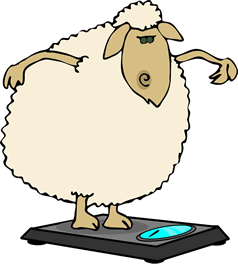 Have you ever heard that “diets make you fat”? Experts tell us that there are a couple of reasons why diets tend to make us fat. What they say makes a lot of sense. We tend to think of a diet as a way to deprive ourselves of foods that we enjoy until we lose some weight. After we have lost a lot or a little weight, we usually go back to our old eating habits and gain most, if not all, of the weight back. Why? We felt deprived of “normal” foods, and think that once the diet is over, we now deserve some of the foods we sacrificed during those difficult diet days.
Have you ever heard that “diets make you fat”? Experts tell us that there are a couple of reasons why diets tend to make us fat. What they say makes a lot of sense. We tend to think of a diet as a way to deprive ourselves of foods that we enjoy until we lose some weight. After we have lost a lot or a little weight, we usually go back to our old eating habits and gain most, if not all, of the weight back. Why? We felt deprived of “normal” foods, and think that once the diet is over, we now deserve some of the foods we sacrificed during those difficult diet days.
I think that this same problem carries over into religion. I know what I’m about to say is shocking, but I’m going to say it anyway: “Religion makes you sinful.” This is true for many of the same reasons that diets make us fat.
Sometimes we feel guilty because we know we’ve done wrong things (sin). Maybe a major crisis is looming—sickness, layoffs at work, or a relationship is about to break up. Those things can motivate us to get more religious. Religion, in most people’s minds, is about giving up the things we want in order to do more religious things. It could mean going to church instead of sleeping in, or reading the Bible instead of watching a favorite TV show, or changing a number of other behaviors.
Here is the problem. Trying to make up for our sin, or trying to get God to do what we desperately want Him to do, doesn’t change our basic desires. We are still the same people. We may be willing to make some temporary sacrifices in order to please God, thinking that He will see our sacrifices (suffering?) and have pity on us. Let’s be honest, though. Working harder to be more religious won’t change our inner desires. When the immediate problem has passed, it’s easy to think that we “deserve” a break from the hardships we added to our lives. Then we go back to sinning, or maybe even to sinning worse than we were before we gave those things up. (See Matthew 7:43-45)
Religion also makes people sinful because when they include more religion in their lives, it inflates a pride in their own goodness. It is so easy to proud of how religious we are. Working hard to be more religious tends to make us feel superior to those around us who are less religious. Some outwardly devout people may even develop a martyr complex: “Woe is me! I have given up so much in order to be more religious.”
Here is the truth we must face. Instead of working harder at being good, we need a radical change. We need God to change us from the inside out. We need this because compared to God, “There is none righteous, not even one; there is none who understands, there is none who seeks for God; all have turned aside, together they have become useless; there is none who does good, there is not even one” (Romans 3:10–12).
We are too broken inside to fix ourselves. That is why God sent Someone to do that for us. Jesus talked about being “born again,” about being changed by the Spirit of God into someone brand new. That kind of change can only happen because Jesus came. He was perfect and sinless, yet He suffered the wrath of God against our sin for us. When we trust Him and turn from our own way to following Him instead, He changes us so that we want to do what pleases Him. That is why Jesus said, “If you love Me, you will keep My commandments” (John 14:15).
Real followers of Christ are humble instead of proud because they know that they don’t deserve the forgiveness they enjoy. “For by grace you have been saved through faith; and that not of yourselves, it is the gift of God; not as a result of works, so that no one may boast” (Ephesians 2:8–9).
The gift of God’s grace keeps Christians from feeling like martyrs even when life is hard because they have an eternal, undeserved gift of forgiveness, and because they have the constant companionship of God Himself. That is why Christians get joy out of worshiping God and learning more about Him. “Serve the Lord with gladness; come before Him with joyful singing” (Psalm 100:2).
Religion just covers up our natural desire to sin and often coats it with a layer of self-righteous pride. Jesus, on the other hand, gives new life, a new direction, and new joy.
